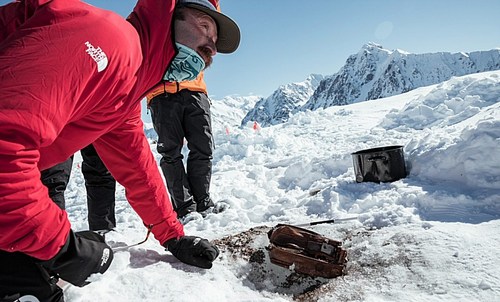Renowned Mountain Explorer Bradford Washburn’s Historic Cache Discovered on Remote Glacier in Canada’s Kluane National Park and Reserve
YUKON, Canada, Oct. 27, 2022 /PRNewswire/ — Outdoor exploration media company Teton Gravity Research (TGR) announced today that a recent expedition, led by professional mountain explorer Griffin Post, has discovered a historic cache of camera equipment and mountaineering gear abandoned by legendary mountaineers Bradford Washburn and Robert Bates in 1937. Washburn and Bates were forced to abandon the gear while attempting to escape the mountains with their lives.

Legendary Mountain Explorer Bradford Washburn’s “Lost Cache” Found after 85 Years
Now, 85 years later, the TGR team has discovered the Washburn-Bates cache of gear on the remote Walsh Glacier in Kluane National Park and Reserve, on the Traditional Territory of the Kluane First Nation, located in Canada’s Yukon Territory.
Among the relics discovered was a significant portion of Washburn’s Fairchild F-8 aerial camera, an item that was successfully extracted from the ice. This camera is believed to be Bradford Washburn’s first-ever aerial photography camera – a format in which he gained worldwide notoriety. In addition to the Fairchild F-8, the team retrieved two motion picture cameras: a DeVry “Lunchbox” model and a Bell & Howell Eyemo 71A, with film still loaded in both motion cameras, along with several pieces of mountaineering equipment.
Griffin was joined by glaciologist Dorota (Dora) Medrzycka, who leveraged innovative glacial mapping processes to determine where the cache may have moved over decades on the glacier. Her team at The University of Ottawa supported Dora remotely, led by Dr. Luke Copland. Upon finding the cache, the expedition team meticulously documented its location and then reported the find to Parks Canada, the agency that oversees national parks in Canada. In collaboration with Kluane First Nation, Griffin, Dora, and a team from Parks Canada returned to the glacier a few weeks later to retrieve what they could of the cache while following the best practices as determined by Parks Canada archaeologists.
“While there’s the obvious historical value in retrieving these artifacts, particularly the camera and film from one of the most legendary aerial photographers in history, the scientific value of the find is equally important, providing researchers with a data point to calculate glacier movements in the area that predates any other data point by decades,” said expedition lead, Griffin Post.
The discovery of the Washburn-Bates cache unlocks never-before-known glacial movement data. Until now, scientists only had data on the glacier’s movements dating back to the ’60s. This new find enables scientists to better understand how the velocity and thickness of Walsh Glacier have changed over a longer period than is available from almost any other data source. Such new information could be helpful to scientists endeavoring to decode the impact of climate change on our glaciers and our world.
“The rediscovery of the Washburn-Bates cache after 85 years locked in the ice adds a tangible dimension to an exciting story of exploration and survival at almost unbelievable odds,” said Sharon Thomson, an archaeologist for Parks Canada. “From a cultural resource management perspective, it presents a rare and valuable opportunity to study change over time on an archaeological site in a dynamic glacial environment.”
A Teton Gravity Research expedition film crew documented the discovery and recovery of the artifacts and the company plans to release the film project in the near future.
A Parks Canada team of conservators, working from their laboratory facilities in Ottawa and Winnipeg, are currently treating the artifacts that were removed from the glacier in order to preserve them for years to come. The Parks Canada team looks forward to sharing these objects and the associated stories of historical significance with the public.
Teton Gravity’s expedition was made possible by Sierra Nevada Brewing Company and by Protect Our Winters.
For more information contact:
Lynn Munroe / [email protected]
About Kluane National Park and Reserve:
Kluane National Park and Reserve is a Canadian national park cooperatively managed by Parks Canada, Champagne and Aishihik First Nations, and Kluane First Nation. This 22,000 square kilometer park is part of a UNESCO World Heritage Site and is home to extensive icefields with 17 of the 20 tallest mountains in Canada. An important element of the human experience in the park is the history of mountaineering in the icefields, which are part of the traditional homelands of the Lhù’ààn Mân Ku Dań, the Kluane Lake People.
About Teton Gravity Research
Founded by brothers Steve and Todd Jones, Teton Gravity Research is a world-leading brand in the outdoor action, adventure, and exploration space; both in active participation and in lifestyle. Griffin Post has spent the better part of the last decade traveling the world in search of mountains to ski. Appearing in the past seven films by Teton Gravity Research, Post has made significant descents from the Tetons to the Arctic Circle, earning accolades from ESPN and Powder magazine along the way.
PRESS CONTACT
Lynn Munroe
845-548-1211
SOURCE Teton Gravity Research
